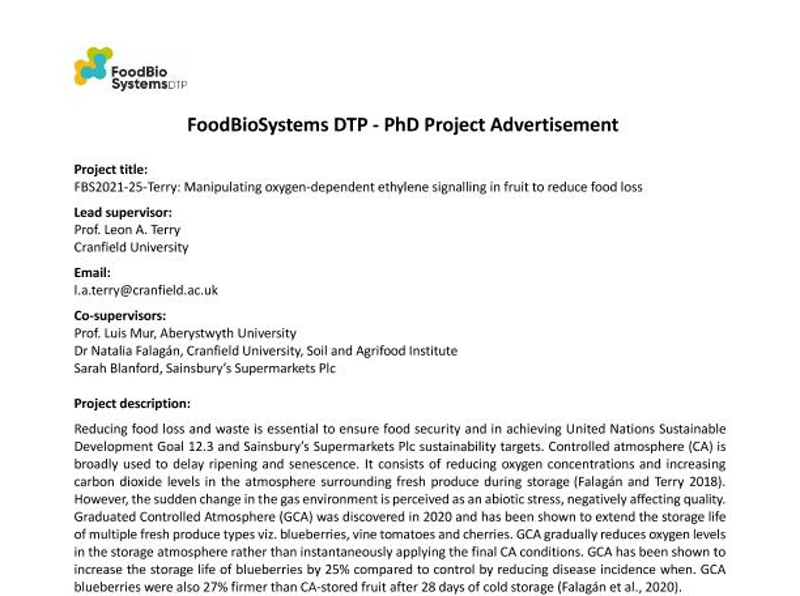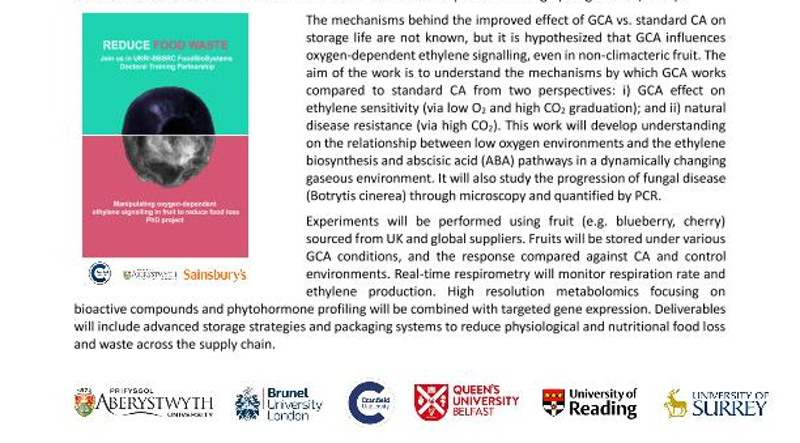

Reducing food loss and waste is essential to ensure food security and in achieving United Nations Sustainable Development Goal 12.3 and Sainsbury's Supermarkets Plc sustainability targets.
This opportunity for a young academic was brought to my attention and if anyone is interested;
The closing date for applications will be 8 February 2021
This notice of Sainsburys support for a PhD study of GCA is an excellent opportunity for a young academic with an interest in food storage technology.
To apply Please go to FoodBioSystems DTP website for information on how to apply for this studentship. The closing date for applications will be 8 February 2021.


FoodBioSystems DTP - PhD Project Advertisement
Project title: FBS2021-25-Terry: Manipulating oxygen-dependent ethylene signalling in fruit to reduce food loss
Lead supervisor: Prof. Leon A. Terry Cranfield University
Email: l.a.terry@cranfield.ac.uk
Co-supervisors: Prof. Luis Mur, Aberystwyth University Dr Natalia Falagan, Cranfield University, Soil and Agrifood Institute Sarah Blanford, Sainsbury's Supermarkets Plc
Project description:
Reducing food loss and waste is essential to ensure food security and in achieving United Nations Sustainable Development Goal 12.3 and Sainsbury's Supermarkets Plc sustainability targets. Controlled atmosphere (CA) is broadly used to delay ripening and senescence. It consists of reducing oxygen concentrations and increasing carbon dioxide levels in the atmosphere surrounding fresh produce during storage (Falagan and Terry 2018).
However, the sudden change in the gas environment is perceived as an abiotic stress, negatively affecting quality. Graduated Controlled Atmosphere (GCA) was discovered in 2020 and has been shown to extend the storage life of multiple fresh produce types viz. blueberries, vine tomatoes and cherries. GCA gradually reduces oxygen levels in the storage atmosphere rather than instantaneously applying the final CA conditions. GCA has been shown to increase the storage life of blueberries by 25% compared to control by reducing disease incidence when. GCA blueberries were also 27% firmer than CA-stored fruit after 28 days of cold storage (Falagan et al., 2020).
The mechanisms behind the improved effect of GCA vs. standard CA on storage life are not known, but it is hypothesized that GCA influences oxygen-dependent ethylene signalling, even in non-climacteric fruit. The aim of the work is to understand the mechanisms by which GCA works compared to standard CA from two perspectives: i) GCA effect on ethylene sensitivity (via low O2 and high CO2 graduation); and ii) natural disease resistance (via high CO2). This work will develop understanding on the relationship between low oxygen environments and the ethylene biosynthesis and abscisic acid (ABA) pathways in a dynamically changing gaseous environment. It will also study the progression of fungal disease (Botrytis cinerea) through microscopy and quantified by PCR.
Experiments will be performed using fruit (e.g. blueberry, cherry) sourced from UK and global suppliers. Fruits will be stored under various GCA conditions, and the response compared against CA and control environments. Real-time respirometry will monitor respiration rate and ethylene production. High resolution metabolomics focusing on bioactive compounds and phytohormone profiling will be combined with targeted gene expression. Deliverables will include advanced storage strategies and packaging systems to reduce physiological and nutritional food loss and waste across the supply chain.
REDUCE FOOD WASTE Join us in UKRI-BBSRC FoodBioSystems Doctoral Training Partnership
Manipulating oxygen-dependent ethylene signalling in fruit to reduce food loss PhD project
With this project you will develop fundamental science on biological mechanisms of fresh fruit and vegetables which will allow you to impact: - Research: by contributing to the existing knowledge gap in fresh produce postharvest behaviour. - Industry: by developing technology able to maintain quality and safety across the supply chain. - Society: by helping reduce food loss and waste, one of our main global challenges.
Training opportunities:
The PhD student will have a placement for no less than three months at Sainsbury's Supermarkets Plc headquarters (London) to learn real-world postharvest management strategies such as storage, packaging, packhouse operations and quality control systems. The student will work with Sainsbury's and selected suppliers.
The student will have in-house training at Cranfield through the Doctoral Researchers Core Development programme, where they will improve their writing, public speaking, and employability skills, among others. They will also have the opportunity to enrol in two-week MSc modules in 'Postharvest Technology' and 'Food Chain Resilience' as part of the MSc in Food Systems and Management at Cranfield. These modules will contribute to the student's understanding of the existing knowledge gaps in the area and the current limitations the industry is facing.
Aberystwyth will provide training on metabolic profiling based on their high-resolution mass-spectrometry based on direct infusion and HPLC linked Orbitrap and Time of Flight Mass spectrometers. The student will be trained in the generation and analysis of metabolomic data. The student will also have the opportunity to present their work at national and international conference such as the International Postharvest Symposium.
Student profile: This project would be suitable for a candidate with a passion for science and curiosity driven research. A degree in biology or biochemistry will be required. A MSc in food systems will be beneficial.
Funding Note This project is part of the FoodBioSystems BBSRC Doctoral Training Partnership (DTP), it will be funded subject to a competition to identify the strongest applicants. The studentship is open to UK and international students (including EU countries) however due to funding rules, no more than 30% of the projects can be allocated to international students. The funding will include a tax free stipend (minimum £15, 285 per year), support for tuition fees at the standard UK rate (currently £4,407 per year) and a contribution towards research costs. Please note that the host universities have not yet confirmed the level of fees charged to international students funded by the DTP. Fee levels may vary across the institutions. This information will be shared on the FoodBioSystems DTP website as soon as it becomes available.
To apply Please go to FoodBioSystems DTP website for information on how to apply for this studentship. The closing date for applications will be 8 February 2021.
References: Falagan N, Terry L.A. (2018). Recent advances in controlled and modified atmosphere of fresh produce: Postharvest technologies to reduce food waste and maintain fresh produce quality. Johns. Matthey Technol. Rev.62,107-117. Falagan, N., Miclo, T., Terry, L.A. (2020). Graduated controlled atmosphere: a novel approach to increase 'Duke' blueberry storage life. Front. Plant Sci.11,221.
![]() That is all for this week
That is all for this week
Take care
The English Apple Man